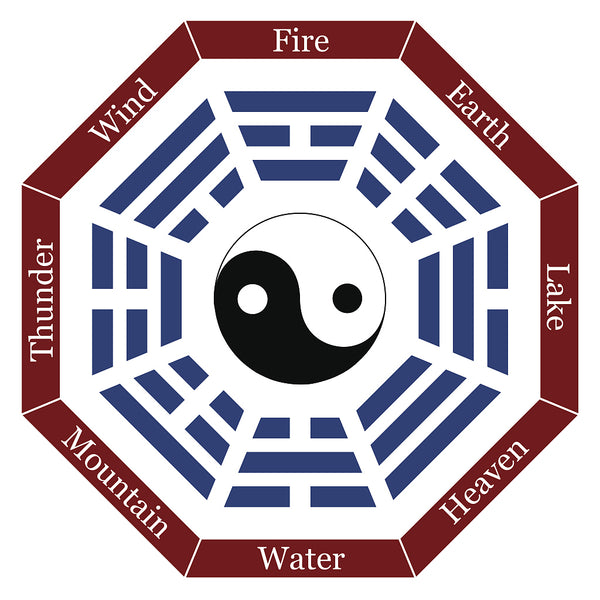What is Feng Shui?
Feng Shui is a Chinese philosophical and metaphysical practice that aims to harmonize individuals with their surrounding environment. The term "feng shui" literally means "wind and water" in Chinese, and it refers to the idea that the flow of these elements can affect the energy (or "qi") in a space, which in turn can influence the fortunes and well-being of the people who inhabit it.
Navigation
The history of feng shui can be traced back to ancient China, where it was used primarily in the construction of tombs and dwellings. The practice evolved over time to include the study of landscape features and the effects of celestial movements, as well as the placement and arrangement of objects and structures in a space.
Feng shui is based on the concept of yin and yang, which are two complementary, yet opposing, forces that are present in all aspects of life. It also incorporates the five elements of wood, fire, earth, metal, and water, which are believed to interact in specific ways to create balance and harmony in a space.
Over the centuries, feng shui has become a widely practiced and influential tradition in China and throughout the world. It has been used in a variety of contexts, including architecture, interior design, and personal wellness. While feng shui remains a controversial and debated practice in some circles, its principles and techniques continue to be studied and applied by practitioners around the globe.
The Concepts of Yin-Yang and Five Elements in Feng Shui
The concepts of yin and yang, as well as the five elements, are fundamental to the practice of feng shui. Yin and yang are complementary yet opposing forces that are present in all aspects of life. Yin represents feminine, passive, and receptive qualities, while yang represents masculine, active, and assertive qualities. In feng shui, the goal is to achieve balance and harmony between these two forces.

The five elements of wood, fire, earth, metal, and water are believed to interact in specific ways to create balance and harmony in a space. Each element has its own characteristics and associations. Wood represents growth, flexibility, and upward movement. Fire represents passion, transformation, and energy. Earth represents stability, grounding, and nourishment. Metal represents strength, clarity, and precision. Water represents flow, adaptability, and emotional depth.

In feng shui, each element is associated with specific colors, shapes, and materials, and is thought to have a particular influence on the energy (or "qi") of a space. The goal is to create a balance of the five elements in a space to promote harmony and well-being.
By understanding and applying the principles of yin and yang and the five elements, practitioners of feng shui aim to create spaces that support the health, happiness, and prosperity of those who inhabit them. This can involve adjusting the placement of objects, using specific colors and materials, or making other changes to the environment to optimize the flow of qi.
How Feng Shui Improve Our Life
Feng shui is an ancient Chinese practice that seeks to create balance and harmony in the surrounding environment. While some may dismiss it as mere superstition, there are many tangible benefits to incorporating feng shui principles into your life.
Improved Health: By optimizing the flow of qi in your living or work space, feng shui can promote better health and well-being. This can include reducing stress and anxiety, improving sleep quality, and boosting overall energy levels. Feng shui practitioners also believe that certain elements and colors can have specific health benefits, such as green for healing and blue for relaxation.
Stronger Relationships: Feng shui can also help improve your relationships with others. By creating a welcoming and harmonious environment, you can promote positive energy flow and enhance communication and understanding. For example, placing a mirror in your bedroom can create a sense of unity and increase intimacy in your romantic relationship.
Increased Prosperity: In feng shui, prosperity is linked to the flow of energy and the use of specific symbols and elements. By incorporating items such as a wealth vase, a money tree, or a dragon turtle, you can enhance the positive energy in your space and attract abundance and prosperity into your life.

Enhancing Your Feng Shui: Practical Tips for Adjusting Your Environment and Creating Positive Energy
-
Declutter and Clean: Clutter and mess can disrupt the flow of energy in a space. Start by decluttering and getting rid of anything that no longer serves a purpose. Then, make sure to keep your space clean and tidy to promote a sense of calm and order.
-
Use Colors and Elements: Colors and elements are important in feng shui, as they can influence the energy flow in a space. Consider using warm colors such as red, orange, and yellow in areas where you want to promote energy and activity, while cool colors such as blue, green, and purple can create a sense of calm and relaxation.
-
Arrange Furniture Thoughtfully: The placement of furniture can also affect the flow of energy in a space. Avoid placing furniture with sharp edges or corners in areas where you want to promote relaxation, and make sure to leave plenty of space for energy to flow freely.
-
Add Natural Elements: Incorporating natural elements such as plants, wood, and water can enhance the positive energy in a space. Consider adding a small indoor garden, a water feature, or a piece of natural wood furniture to promote a sense of connection to nature.
-
Use Symbols and Objects: Certain symbols and objects can also promote positive energy flow in a space. For example, placing a wind chime near a window can help enhance the flow of energy, while adding a mirror to a small space can create the illusion of more space and promote positive energy.
Application Of Feng Shui
-
Site Selection: The location of a building can have a significant impact on its feng shui. Ideally, the site should have good "qi," with a balance of yin (passive) and yang (active) energy. Additionally, the surrounding environment, such as nearby mountains and water sources, can influence the flow of qi.
-
Building Orientation: The orientation of a building can also impact its feng shui. In feng shui, it is believed that a building facing south or east can bring prosperity and success, while a building facing north or west can bring challenges. Additionally, the placement of doors and windows can impact the flow of energy in a space.
-
Interior Layout: The layout of a building's interior can impact the flow of energy and the occupants' well-being. For example, it is recommended to avoid long hallways that can create a sense of stagnation. Additionally, spaces should be organized in a way that promotes ease of movement and avoids clutter.
-
Material Selection: The materials used in a building can also impact its feng shui. In feng shui, certain materials are associated with different elements and energies. For example, wood is associated with growth and vitality, while metal is associated with strength and clarity. By incorporating these materials into the building design, you can enhance its feng shui.
-
Color and Lighting: The use of color and lighting can impact the mood and energy of a space. In feng shui, colors and lighting are chosen based on their association with different elements and energies. For example, blue is associated with calmness and serenity, while red is associated with passion and energy. By using these colors and lighting in a deliberate way, you can enhance the building's feng shui.
Feng shui is a traditional Chinese practice that has been used for centuries to create harmonious living spaces and promote well-being. By applying feng shui principles to your home, you can improve the energy flow, balance, and harmony of your living space, resulting in a more peaceful, supportive, and fulfilling life.
Here are some tips on how to apply feng shui to your home:
-
Clear Clutter: In feng shui, clutter is considered a hindrance to the flow of energy, or "qi", in a space. To improve the feng shui of your home, it is important to declutter and organize your living space. Keep your living area tidy and avoid having too many unnecessary items, especially in the entryway and living room.
-
Balance Elements: In feng shui, it is believed that there are five natural elements that need to be in balance to ensure a harmonious living space: wood, fire, earth, metal, and water. The placement of these elements in your home can affect the energy flow, so it is important to make sure that each element is represented in your living space, and that they are in harmony with each other.
-
Furniture Placement: The placement of furniture can affect the energy flow of your living space. In feng shui, it is recommended to place furniture in a way that promotes ease of movement and conversation. Additionally, it is important to avoid placing furniture in a way that blocks doorways or windows, as this can disrupt the flow of energy.
-
Color and Lighting: Color and lighting are powerful tools that can affect the mood and energy of a space. In feng shui, different colors and lighting are associated with different elements and energies. For example, red is associated with passion and energy, while blue is associated with calmness and relaxation. By choosing colors and lighting that resonate with your personal energy, you can enhance the feng shui of your home.
-
Nature Elements: In feng shui, bringing natural elements into your home can improve the energy flow and balance. Indoor plants, flowers, and crystals are great ways to introduce nature into your living space. They can help to purify the air, reduce stress, and create a sense of calmness and well-being.
-
Feng Shui Decorations: In addition to natural elements, certain feng shui decorations like Pixiu can also be used to enhance energy flow in the home. Pixiu is a mythical creature that is believed to bring wealth and good fortune. It is often depicted as a winged lion with a large mouth that can swallow and retain wealth. By placing Pixiu in a prominent location in your home, you can attract positive energy and prosperity.
In conclusion, by applying feng shui principles to your home, you can create a more balanced and supportive living space. These tips are just a starting point, and it is important to personalize your approach to feng shui based on your unique needs and preferences. With a little effort and attention, you can improve the feng shui of your home, and in turn, improve the quality of your life.
Commercial Feng Shui refers to the application of Feng Shui principles and techniques in commercial spaces, with the aim of improving business operations and attracting customer traffic. Here are some applications of Commercial Feng Shui:
-
Site selection: Site selection is crucial in Commercial Feng Shui. A good location and environment can bring more foot traffic and business opportunities to a store. When selecting a site, it is important to consider the surrounding environment and roads to ensure that the store has a good energy field.
-
Layout design: Commercial Feng Shui emphasizes the design of a store's layout. The layout should be conducive to the flow of energy and create a harmonious atmosphere. The placement of furniture and decoration items should also be taken into consideration to ensure they are aligned with the store's business goals.
-
Lighting and color: Proper lighting and color can also contribute to a store's Feng Shui. Bright and natural lighting can improve the energy flow, while specific colors can create a certain mood or atmosphere. For example, warm colors such as red and orange can create a welcoming and energetic environment, while cool colors such as blue and green can create a calming and relaxing environment.
-
Signage and branding: The signage and branding of a store should also be in line with its Feng Shui. The design and placement of signage should be carefully considered to attract positive energy, while the store's branding should convey a strong and positive message to customers.
-
Maintenance and cleanliness: Regular maintenance and cleanliness are essential in maintaining good Feng Shui in a commercial space. A cluttered and dirty environment can create negative energy and repel customers, while a clean and well-maintained environment can attract positive energy and customers.
By applying Commercial Feng Shui principles and techniques, businesses can improve their operations, attract more customers, and ultimately increase their profitability.
The Controversies and Current State of Feng Shui
Feng shui is still a controversial and uncertain topic in modern society. On one hand, some people believe that feng shui is an effective way to adjust the environment and promote personal physical and mental health. On the other hand, some skeptics view feng shui as a superstition or pseudoscience that lacks empirical evidence.
Despite these controversies, feng shui remains popular in many parts of the world, particularly in East and Southeast Asia. Many people still consult feng shui masters and use feng shui principles in their homes, workplaces, and businesses.
In recent years, there have been efforts to incorporate feng shui principles into modern architecture and design. For example, some architects have designed buildings with feng shui principles in mind, such as incorporating natural light and ventilation, optimizing the placement of doors and windows, and using certain colors and materials.
Overall, the current state of feng shui is complex and multifaceted. While there are still debates about its effectiveness and validity, feng shui continues to influence many aspects of daily life and the built environment.










